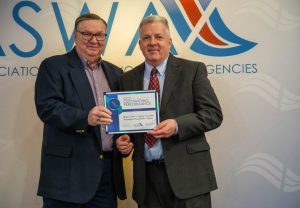The MHA Service Corporation (MHASC) board held its final meeting of the 2022-2023 program year focused on supporting the MHA Strategic Action Plan priorities of workforce sustainability, financial viability, achieving health equity and improving access and funding for behavioral health. Members are invited to review the July MHA CEO Report for more information on the association’s efforts to address these ongoing priorities.
The MHASC board celebrated the 2023 Outstanding Performance award given to the MHA Unemployment Compensation Program (MHA-UCP) by the National Association of State Workforce Agencies. This award affirms the MHA-UCP’s dedicated work to reduce unemployment liability for its clients, decrease unemployment fraud and prevent waste with state unemployment agencies. The MHA-UCP has a large portfolio of healthcare employer clients throughout the country, including many MHA members. To learn more about the services available, members may contact Neil MacVicar at the MHA-UCP.
The board was joined by Kelsey Stevens, principal and senior consulting actuary, Wakely, for an overview of actuarial and risk management services for value-based payment arrangements and more. MHASC is planning to launch new Endorsed Business Partnerships in the coming weeks.
The MHASC board had several appointments and reappointments adding depth and breadth of expertise and welcomed new MHASC board members Melissa Holmquist, CEO, Upper Peninsula Health Plan, Marquette; Paul Karsten, CFO, Pine Rest Christian Mental Health Services, Grand Rapids; Peter Marinoff, south regional president, Munson Healthcare, Cadillac; and Scott McLean, managing director, Corewell Health Ventures, Grand Rapids. The board recognized David Leonard, JD, chief legal officer, Corewell Health, Grand Rapids and Southfield, and Dennis Smith, president, Dennis H. Smith Consulting, LLC, Marquette, for their service on the board ending this year. The board also affirmed the reappointments of Betty Chu, MD, chief quality officer, Henry Ford Health, Detroit; Brian Connolly, Connolly Associates, Rapid City; Brett Furst, founder & CEO, Foresight Ventures, Lake Orion; Marita Hattem-Schiffman, president & CEO, MyMichigan Health Central Region, Alma; and Chair Kent Riddle, CEO, Mary Free Bed Rehabilitation Hospital, Grand Rapids.
The MHASC provides critical support to the MHA in the form of nondues revenue through its Data Services, Unemployment Compensation Program and Endorsed Business Partner program to address workforce, financial and other business needs. Visit the MHA Business Services webpage to learn more about resources available.
Questions regarding the MHASC Board should be directed to Ruthanne Sudderth at the MHA.


